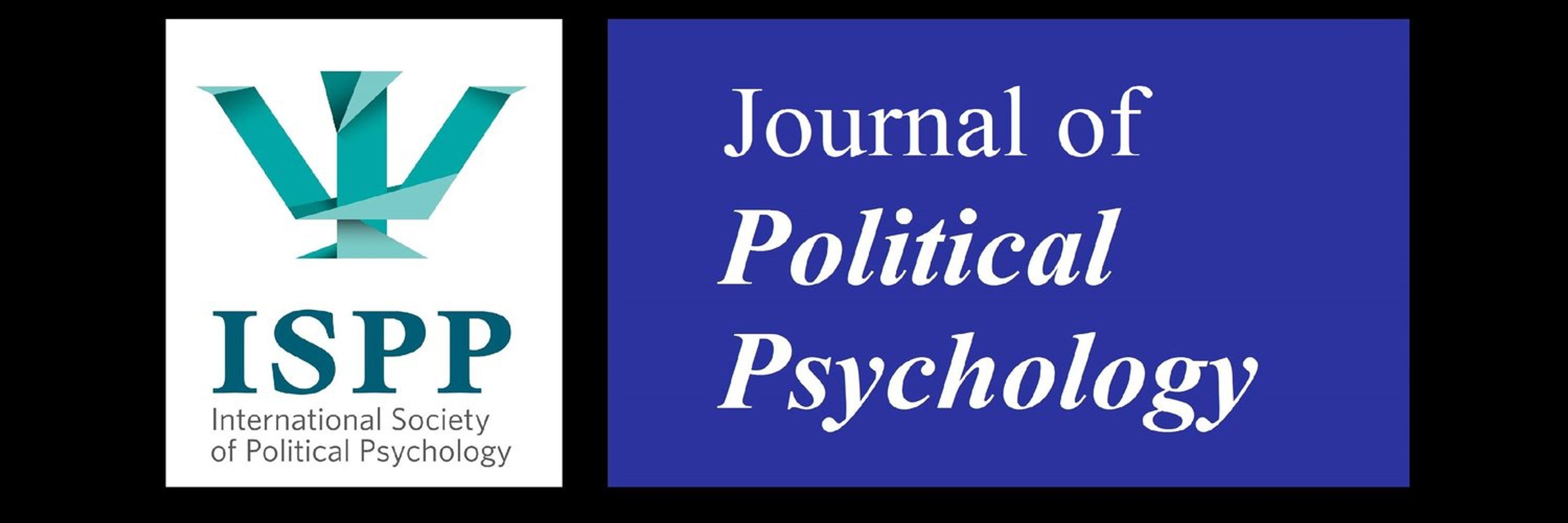
Political Psychology
@ispp-pops.bsky.social
Political Psychology is a peer-reviewed academic journal published by ISPP (@polpsyispp.bsky.social)
co-EiC: @lizsuhay.bsky.social & @mjbsp.bsky.social
Follow us everywhere & current issue: linktr.ee/POPSjournal
co-EiC: @lizsuhay.bsky.social & @mjbsp.bsky.social
Follow us everywhere & current issue: linktr.ee/POPSjournal
When does "they" go from pronoun to Pronoun? In our October issue, Renström & Klysing study ideological ties to use/views of gender-inclusive language. Read their findings on how Social Dominance Orientation & Right Wing Authoritarianism relate to de-gendered & multi-gendered "they." buff.ly/durLXMS


November 6, 2025 at 5:25 PM
When does "they" go from pronoun to Pronoun? In our October issue, Renström & Klysing study ideological ties to use/views of gender-inclusive language. Read their findings on how Social Dominance Orientation & Right Wing Authoritarianism relate to de-gendered & multi-gendered "they." buff.ly/durLXMS
What do our leaders say after tragedy? Layous et al. study Congressmembers' official statements after George Floyd's death. They find sorrow shared equally by Republicans & Democrats, but trends of system "defending" & system "mending" statements from each, respectively. Read more: buff.ly/J0MVJBD
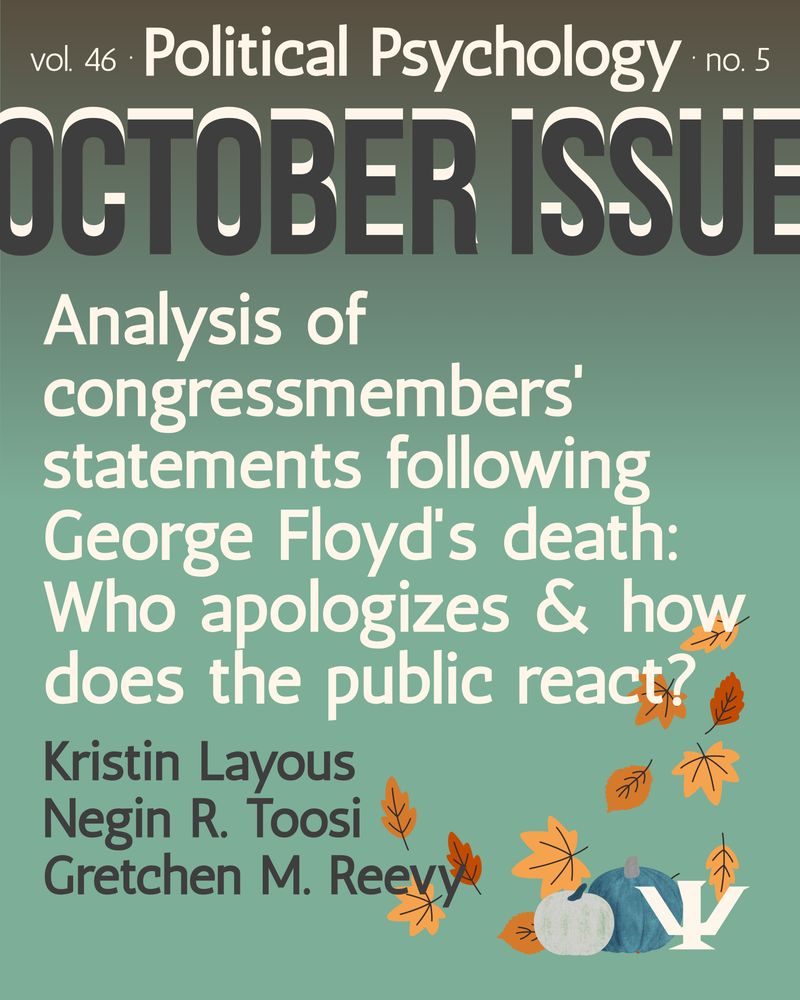
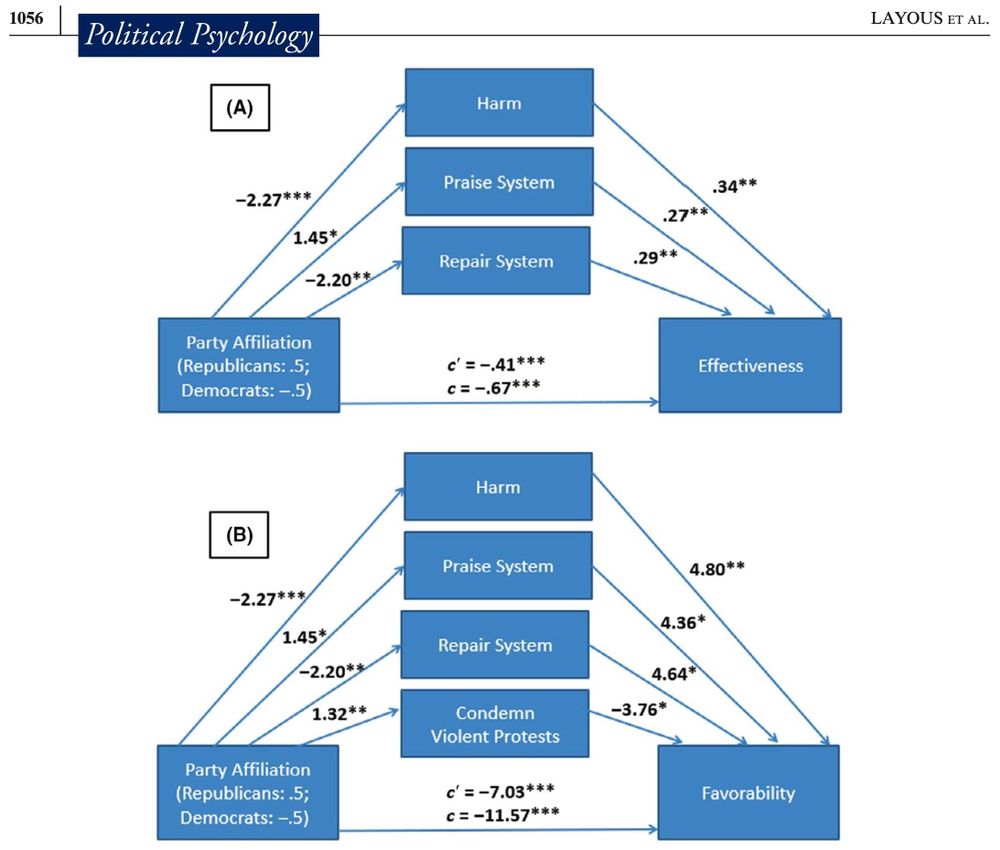
November 5, 2025 at 6:30 PM
What do our leaders say after tragedy? Layous et al. study Congressmembers' official statements after George Floyd's death. They find sorrow shared equally by Republicans & Democrats, but trends of system "defending" & system "mending" statements from each, respectively. Read more: buff.ly/J0MVJBD
Does the carceral state discourage or mobilize voters? Krishnamurthy's piece in our October issue on California's Proposition 47 finds that high incarceration rate communities were associated w/ increased voter turnout & higher support for the criminal justice reform measure. doi.org/10.1111/pops...

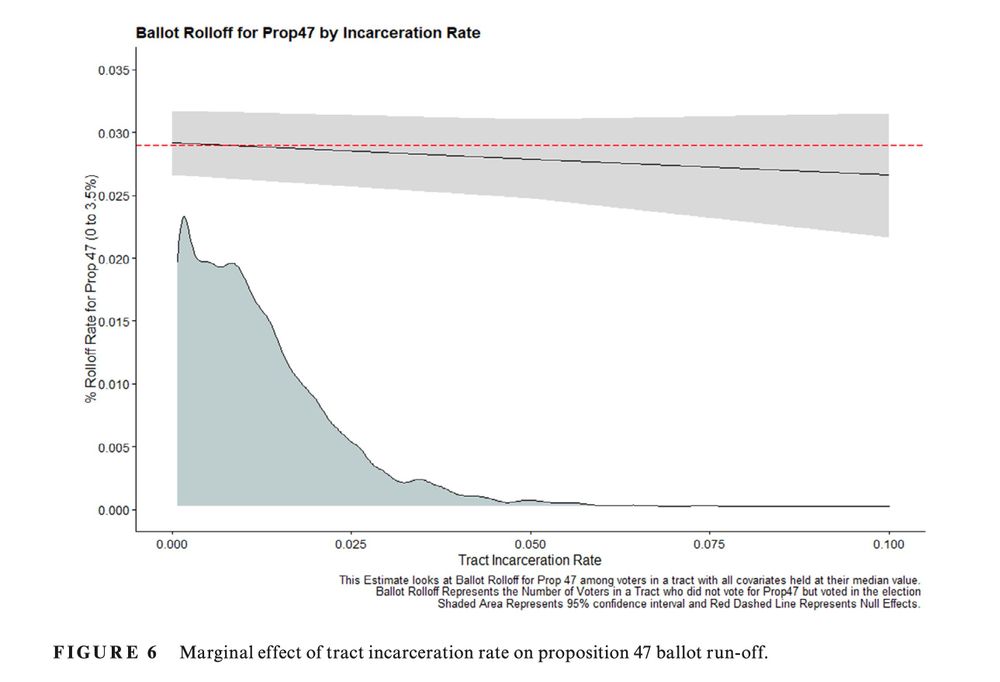


November 4, 2025 at 6:58 PM
Does the carceral state discourage or mobilize voters? Krishnamurthy's piece in our October issue on California's Proposition 47 finds that high incarceration rate communities were associated w/ increased voter turnout & higher support for the criminal justice reform measure. doi.org/10.1111/pops...
Who motivates future political engagement? Wegemer & Levy's panel study of high school students finds that political interest is mostly self-driven. For most students, motivation largely predicted more political discussions, rather than the other way around. Read online: doi.org/10.1111/pops...



October 31, 2025 at 3:26 PM
Who motivates future political engagement? Wegemer & Levy's panel study of high school students finds that political interest is mostly self-driven. For most students, motivation largely predicted more political discussions, rather than the other way around. Read online: doi.org/10.1111/pops...
What makes some people tolerate organized crime like the mafia? This article from Mirisola et al. in our October issue points to the interplay of national and territorial identity and masculine honor values as leading factors. Read the full article online for more: doi.org/10.1111/pops...



October 28, 2025 at 6:28 PM
What makes some people tolerate organized crime like the mafia? This article from Mirisola et al. in our October issue points to the interplay of national and territorial identity and masculine honor values as leading factors. Read the full article online for more: doi.org/10.1111/pops...
How does culture impact system justification in individuals? This article from Li & Tian exploring political belief finds that views prioritizing relationships & harmony are linked to a stronger tendency to justify the existing social & political system. Read online: buff.ly/yJQjeTY


October 21, 2025 at 1:54 PM
How does culture impact system justification in individuals? This article from Li & Tian exploring political belief finds that views prioritizing relationships & harmony are linked to a stronger tendency to justify the existing social & political system. Read online: buff.ly/yJQjeTY
Do we grow out of susceptibility to conspiracy beliefs? In our October issue, Bordeleau & Stockemer's analysis of existing research finds a negative correlation between age and conspiracy endorsement. Read the findings and what they could mean for future conspiracy research: doi.org/10.1111/pops...


October 16, 2025 at 6:05 PM
Do we grow out of susceptibility to conspiracy beliefs? In our October issue, Bordeleau & Stockemer's analysis of existing research finds a negative correlation between age and conspiracy endorsement. Read the findings and what they could mean for future conspiracy research: doi.org/10.1111/pops...
How do we decide if we can trust another group? Wei et al.'s article in our October issue shows that trust is a complex dynamic, not built on one trait alone. They find that warmth towards an outgroup only boosts trust when also seen as competent.
Read more online: doi.org/10.1111/pops...
Read more online: doi.org/10.1111/pops...



October 15, 2025 at 5:59 PM
How do we decide if we can trust another group? Wei et al.'s article in our October issue shows that trust is a complex dynamic, not built on one trait alone. They find that warmth towards an outgroup only boosts trust when also seen as competent.
Read more online: doi.org/10.1111/pops...
Read more online: doi.org/10.1111/pops...
October is here and so is the latest issue of Political Psychology! This issue is jam-packed with 25 original articles. Check it out online here: buff.ly/cxAMGba
October 3, 2025 at 3:47 PM
October is here and so is the latest issue of Political Psychology! This issue is jam-packed with 25 original articles. Check it out online here: buff.ly/cxAMGba
The last article from our August issue is a review by Eric Baldwin of two books looking at the state of radicalization and what it means for US politics. Read the insightful analysis online: doi.org/10.1111/pops...

September 11, 2025 at 4:09 PM
The last article from our August issue is a review by Eric Baldwin of two books looking at the state of radicalization and what it means for US politics. Read the insightful analysis online: doi.org/10.1111/pops...
What drives attitudes towards economic mobility & redistributive policies? Research from Matamoros-Lima et al. in our August issue finds that the perceived difficulty (or ease) in improving socioeconomic status helps to shape support for redistribution. Read open-access: doi.org/10.1111/pops...

September 10, 2025 at 5:07 PM
What drives attitudes towards economic mobility & redistributive policies? Research from Matamoros-Lima et al. in our August issue finds that the perceived difficulty (or ease) in improving socioeconomic status helps to shape support for redistribution. Read open-access: doi.org/10.1111/pops...
What does it mean to be European? Mayer et al.'s article in our August issue looks at adolescents' ideas of European identity in Germany. Read open-access online for how these conceptualizations of identity shape intolerance, support of the EU, and more: doi.org/10.1111/pops...
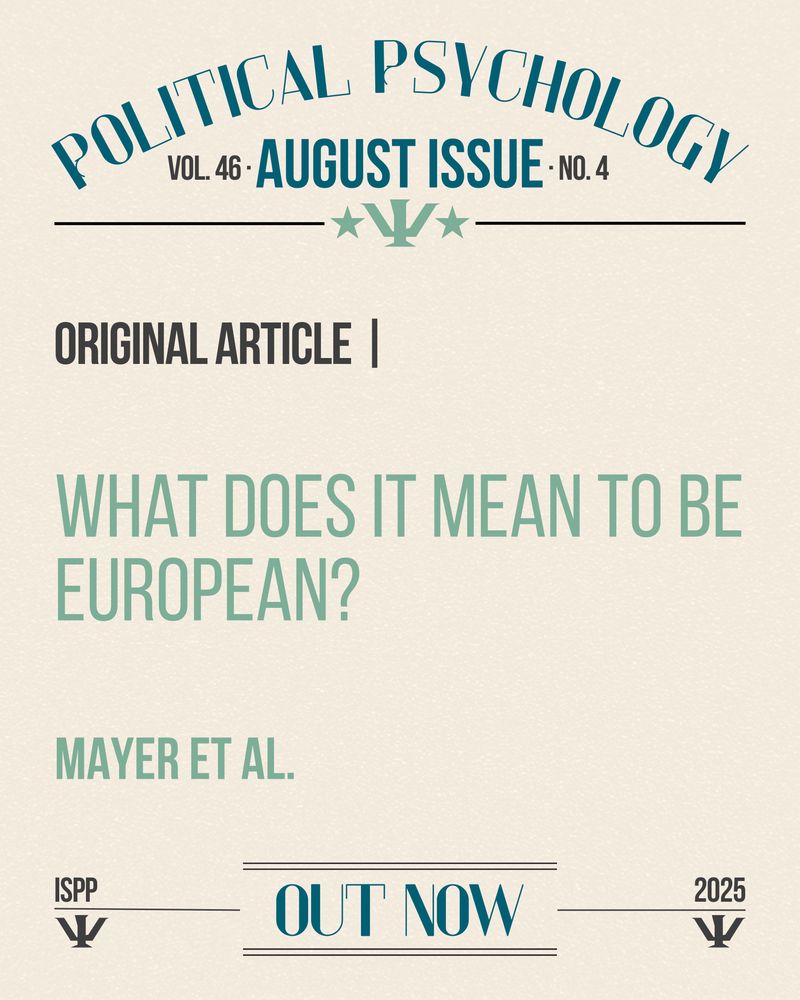
September 4, 2025 at 6:13 PM
What does it mean to be European? Mayer et al.'s article in our August issue looks at adolescents' ideas of European identity in Germany. Read open-access online for how these conceptualizations of identity shape intolerance, support of the EU, and more: doi.org/10.1111/pops...
How do social interactions shape ethnic identity? John Doces' article in our August issue examines the effects of social contact on ethnic identity through a field experiment in West Africa and finds a complex dynamic between interethnic relations & identity. Read more: doi.org/10.1111/pops...

September 3, 2025 at 7:43 PM
How do social interactions shape ethnic identity? John Doces' article in our August issue examines the effects of social contact on ethnic identity through a field experiment in West Africa and finds a complex dynamic between interethnic relations & identity. Read more: doi.org/10.1111/pops...
Working on political psychology research with a focus on East Asia? A new special issue of our journal will center East Asia to broaden the field’s geographic & cultural assumptions. Find the call in the Special Issues section of the link below & consider submitting your work! linktr.ee/POPSjournal

September 2, 2025 at 4:48 PM
Working on political psychology research with a focus on East Asia? A new special issue of our journal will center East Asia to broaden the field’s geographic & cultural assumptions. Find the call in the Special Issues section of the link below & consider submitting your work! linktr.ee/POPSjournal
When & why do individuals defend the political systems they live in? Valdes et al. study the tenets of System Justification Theory in a paper from our August issue. Read open-access for their findings on what motivates people to see their system as just, fair, & legitimate. doi.org/10.1111/pops...

August 28, 2025 at 4:52 PM
When & why do individuals defend the political systems they live in? Valdes et al. study the tenets of System Justification Theory in a paper from our August issue. Read open-access for their findings on what motivates people to see their system as just, fair, & legitimate. doi.org/10.1111/pops...
What drives the decisions of world leaders? From our August issue, Brent Mills applies Moral Foundations Theory to better understand leaders' motivations & behavior using Vladimir Putin as a case study. Read online: doi.org/10.1111/pops...

August 27, 2025 at 5:45 PM
What drives the decisions of world leaders? From our August issue, Brent Mills applies Moral Foundations Theory to better understand leaders' motivations & behavior using Vladimir Putin as a case study. Read online: doi.org/10.1111/pops...
How do societies move past perceived roles of “victim” and “perpetrator” in the aftermath of conflict? In our August issue, Kazarovytska et al. study this in the context of WWII and explore new ways of understanding collective memory and identity. Read open-access here: doi.org/10.1111/pops...

August 26, 2025 at 6:22 PM
How do societies move past perceived roles of “victim” and “perpetrator” in the aftermath of conflict? In our August issue, Kazarovytska et al. study this in the context of WWII and explore new ways of understanding collective memory and identity. Read open-access here: doi.org/10.1111/pops...
Can tolerance promoted by comprehensive welfare states withstand demographic pressure? In studying racial animosity in Sweden following the refugee crisis, Persson & Widmalm found higher levels of antipathy toward political ideologies than ethnic identities. Read open-access: doi.org/10.1111/pops...

August 21, 2025 at 4:02 PM
Can tolerance promoted by comprehensive welfare states withstand demographic pressure? In studying racial animosity in Sweden following the refugee crisis, Persson & Widmalm found higher levels of antipathy toward political ideologies than ethnic identities. Read open-access: doi.org/10.1111/pops...
Does a candidate's gender change the way voters evaluate them? A Rohrbach & Schönhagen article in our August issue studies the role that voters' heuristics and rationalizations play in candidate evaluation. Read the full open-access piece online: doi.org/10.1111/pops...

August 20, 2025 at 6:05 PM
Does a candidate's gender change the way voters evaluate them? A Rohrbach & Schönhagen article in our August issue studies the role that voters' heuristics and rationalizations play in candidate evaluation. Read the full open-access piece online: doi.org/10.1111/pops...
Do ad disclosures on political social media posts change how viewers evaluate a post? Stafford et al.'s study in our August issue suggests disclosures play a strong role in how voters respond to various political messages. Read for more and the implications of their findings: doi.org/10.1111/pops...

August 19, 2025 at 4:53 PM
Do ad disclosures on political social media posts change how viewers evaluate a post? Stafford et al.'s study in our August issue suggests disclosures play a strong role in how voters respond to various political messages. Read for more and the implications of their findings: doi.org/10.1111/pops...
Is there a link between conservatism & perceived openness/tolerance? In our August issue, Rupar et al. find the level of perceived universalism values in society related to right-wing views & nationalism via the view of universalism as threat to trad. ways of life. Read now: doi.org/10.1111/pops...
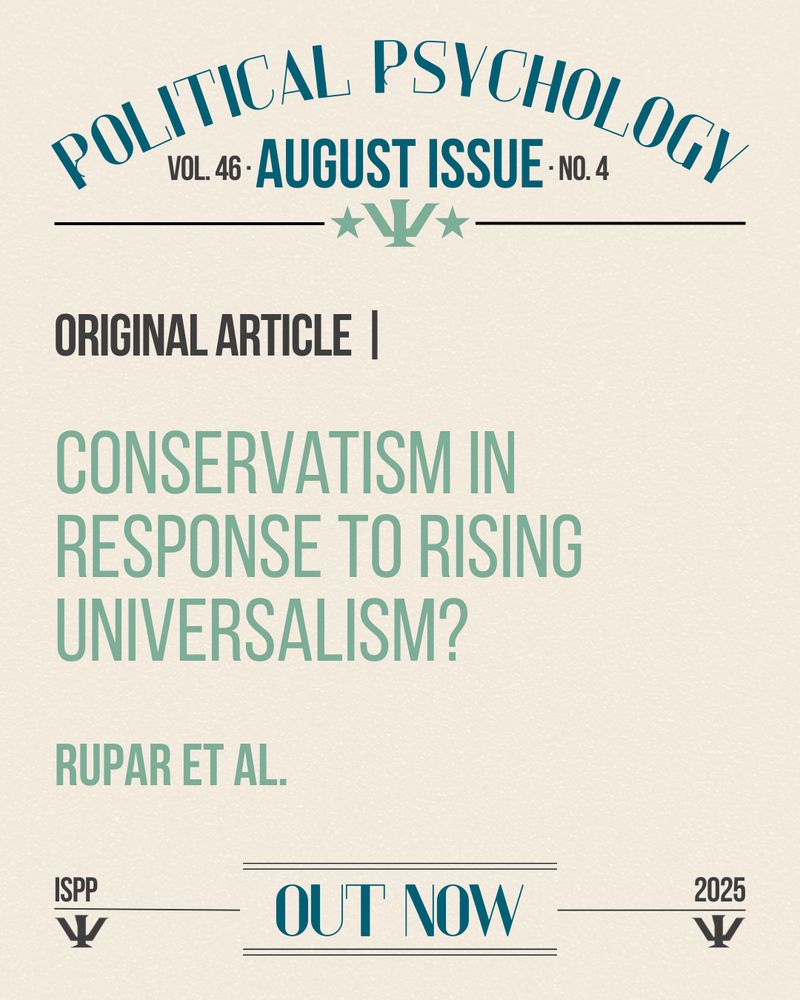
August 14, 2025 at 8:14 PM
Is there a link between conservatism & perceived openness/tolerance? In our August issue, Rupar et al. find the level of perceived universalism values in society related to right-wing views & nationalism via the view of universalism as threat to trad. ways of life. Read now: doi.org/10.1111/pops...
salt air...
new issue to explore
i've never needed anything more
the august issue of political psychology is out now featuring ten original articles and a book review. check out the table of contents for more: buff.ly/fwpNtEo
new issue to explore
i've never needed anything more
the august issue of political psychology is out now featuring ten original articles and a book review. check out the table of contents for more: buff.ly/fwpNtEo


August 1, 2025 at 10:33 PM
salt air...
new issue to explore
i've never needed anything more
the august issue of political psychology is out now featuring ten original articles and a book review. check out the table of contents for more: buff.ly/fwpNtEo
new issue to explore
i've never needed anything more
the august issue of political psychology is out now featuring ten original articles and a book review. check out the table of contents for more: buff.ly/fwpNtEo
The last of our book reviews in our June issue is a piece by Kay Lehman Schlozman. In the article, Schlozman reviews Muirhead & Rosenblum's Ungoverning: The Attack on the Administrative State and the Politics of Chaos. Read the full piece online: doi.org/10.1111/pops...
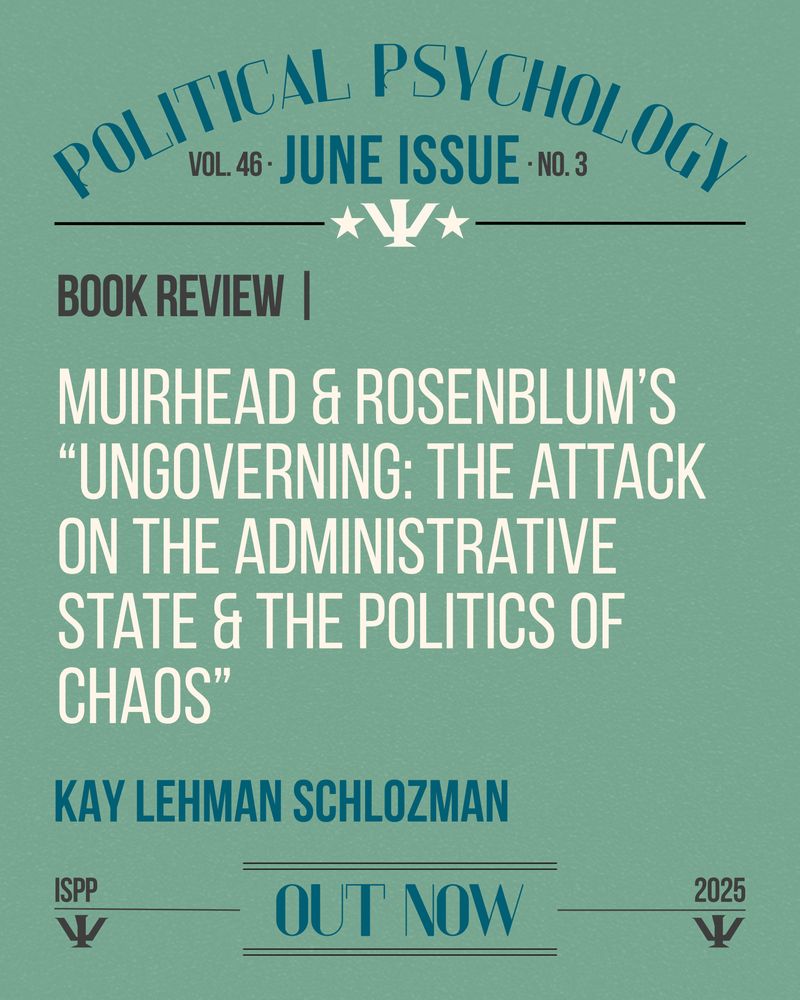
July 30, 2025 at 5:48 PM
The last of our book reviews in our June issue is a piece by Kay Lehman Schlozman. In the article, Schlozman reviews Muirhead & Rosenblum's Ungoverning: The Attack on the Administrative State and the Politics of Chaos. Read the full piece online: doi.org/10.1111/pops...
The second book review from our June issue covers Orla T. Muldoon's The Social Psychology of Trauma. University of Lausanne scholars Eva G.T. Green & Christian Staerklé take a look at how Muldoon's book reframes trauma as a fundamentally social and political process. doi.org/10.1111/pops...
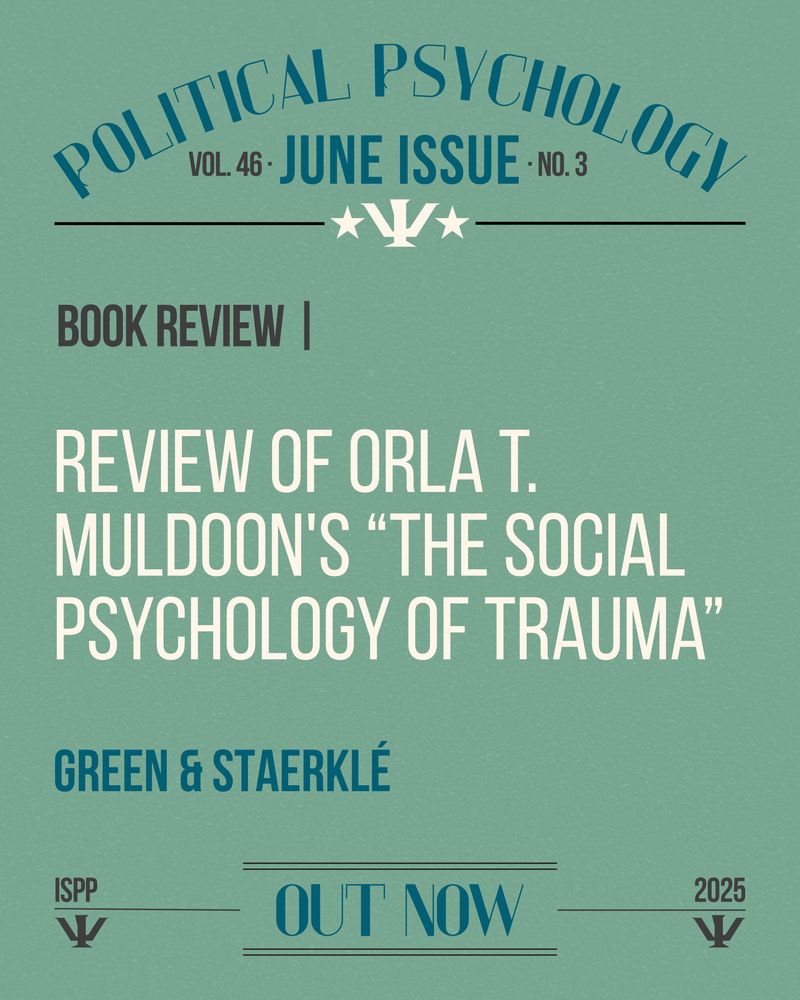
July 29, 2025 at 6:10 PM
The second book review from our June issue covers Orla T. Muldoon's The Social Psychology of Trauma. University of Lausanne scholars Eva G.T. Green & Christian Staerklé take a look at how Muldoon's book reframes trauma as a fundamentally social and political process. doi.org/10.1111/pops...
We have three book reviews to round out our June issue article spotlight. Up first is Carrie Menkel-Meadow's review of Hope Amidst Conflict by Oded Adomi Leshem. Read for the perspective of the award-winning scholar of alternative dispute resolution on Leshem's book doi.org/10.1111/pops...
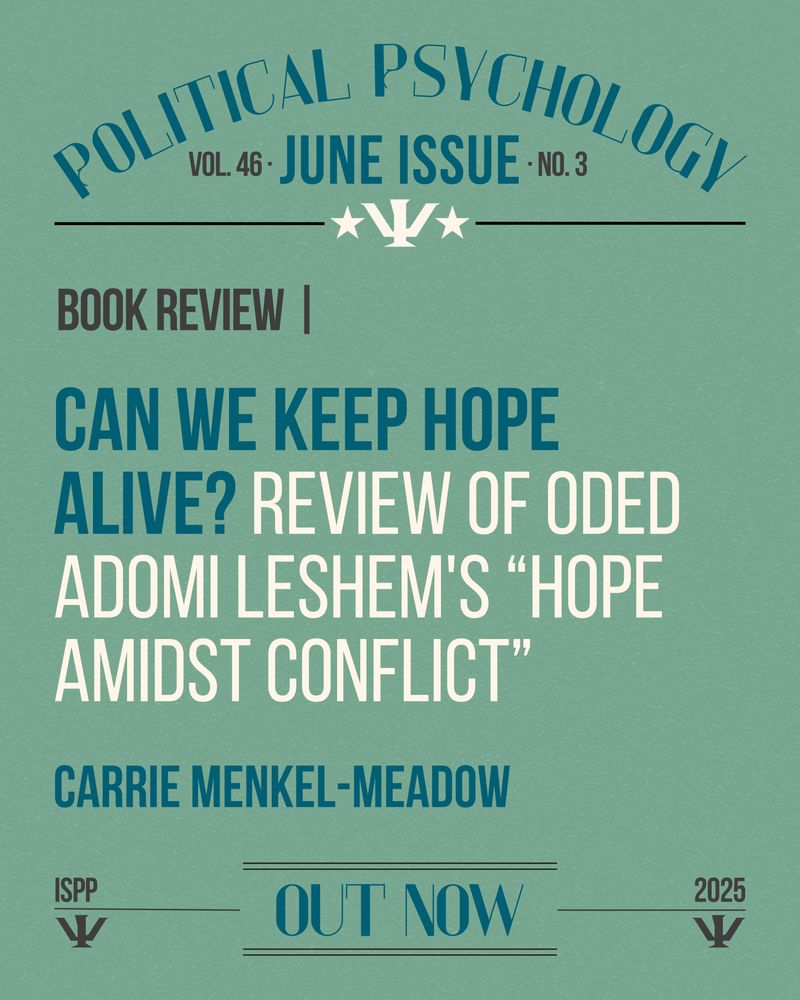
July 28, 2025 at 7:54 PM
We have three book reviews to round out our June issue article spotlight. Up first is Carrie Menkel-Meadow's review of Hope Amidst Conflict by Oded Adomi Leshem. Read for the perspective of the award-winning scholar of alternative dispute resolution on Leshem's book doi.org/10.1111/pops...

